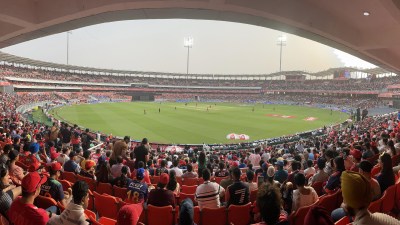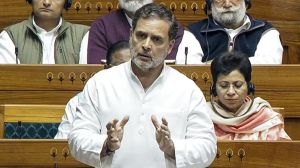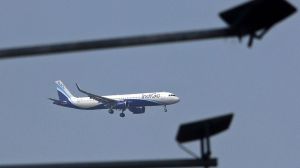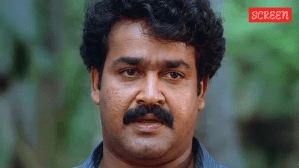France ignoring ICC warrants, Israel-Hezbollah ceasefire, Syrian rebels’ advance and more: roundup of world news this week
From escalating tensions in Ukraine to France ignoring the International Criminal Court warrant against the Israeli PM to Israel and Hezbollah signing a truce to the flare-up in Syria to the protests in Pakistan, this week witnessed several important events.
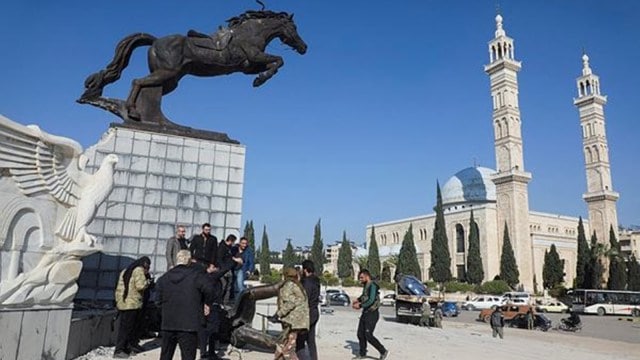 For the first time in four years, Syrian rebels have launched a significant offensive against the Assad regime and its backers, Russia and Iran. (Reuters photo)
For the first time in four years, Syrian rebels have launched a significant offensive against the Assad regime and its backers, Russia and Iran. (Reuters photo)Welcome to this week’s roundup of key global events and developments shaping politics, economics, and society. From groundbreaking policy shifts and diplomatic manoeuvres to emerging stories of resilience and upheaval, we bring you the latest updates and insights. For Indian audiences, understanding these developments is not just about keeping informed—it’s about identifying the ripple effects that could influence India’s foreign policy and its position in an increasingly fragmented world.
Whether it’s a headline-grabbing the world’s attention or an underreported issue with far-reaching consequences, we aim to provide a clear, concise, and comprehensive overview of what matters most.
Escalating tensions in Ukraine
Tensions in Ukraine continue to mount as Russian President Vladimir Putin escalates his rhetoric and military actions. In a chilling warning, Putin announced that Russia could use its new hypersonic ballistic missile, the Oreshnik, to “turn targets in Kyiv to dust”. This threat was framed as a direct response to Ukraine’s deployment of Western long-range missiles to strike within Russia.
“At present, the ministry of defence and the general staff are selecting targets to hit on Ukrainian territory. These could be military facilities, defence and industrial enterprises, or decision-making centres in Kyiv,” Putin declared during a meeting in Kazakhstan. His words signal an intensifying strategy against Ukraine’s infrastructure and leadership hubs, which are concentrated in Kyiv’s heavily fortified government quarter.
Ukraine has already felt the brunt of this escalation. Ukrainian President Volodymyr Zelenskyy reported that “about 100 attack drones, more than 90 missiles of various types” had targeted critical energy facilities, plunging parts of the country into blackouts. Particularly concerning is the alleged use of cluster munitions, weapons known for their devastating effects on civilian populations.
 A resident stands next to his house damaged by a Russian drone strike, amid Russia’s attack on Ukraine, outside of Odesa, Ukraine November 29, 2024. (Reuters photo)
A resident stands next to his house damaged by a Russian drone strike, amid Russia’s attack on Ukraine, outside of Odesa, Ukraine November 29, 2024. (Reuters photo)
Despite these challenges, Ukraine’s air defence systems have demonstrated remarkable resilience, intercepting 90 per cent of incoming missiles. However, 12 missiles evaded interception, underscoring the increasing sophistication of Russian tactics. Russia has reportedly employed thermal and radar traps, electronic jammers on missiles, and taken advantage of adverse weather conditions, including fog and clouds, to challenge Ukraine’s air defence.
The heightened military activity has also forced Ukraine to close its Parliament due to the missile threats. The building, located in Kyiv’s government district, stands alongside key institutions such as the presidential administration and the national bank, making it a likely target in any intensified offensive.
This latest round of threats and strikes underscores the deepening crisis in Ukraine, with devastating consequences for both its civilian population and critical infrastructure.
France ignores International Criminal Court
France has stirred controversy by signalling that it may not detain Israeli Prime Minister Benjamin Netanyahu despite an arrest warrant issued by the International Criminal Court (ICC) for alleged war crimes in Gaza. The French foreign ministry cited Netanyahu’s potential immunity, arguing that Israel’s non-signatory status to the Rome Statute, the treaty establishing the ICC, grants him protection.
“A state cannot be compelled to act in a manner incompatible with its obligations under international law regarding the immunities of states not party to the ICC,” the ministry stated.
“Such immunities apply to Prime Minister Netanyahu and other concerned ministers and must be taken into account if the ICC were to request their arrest and surrender.”
The stance has sparked sharp criticism from human rights organisations like Amnesty International, which called it “deeply problematic” and contrary to France’s obligations as an ICC member. The ICC issued arrest warrants last week for Netanyahu and former defence minister Yoav Gallant, accusing them of “crimes against humanity and war crimes” during Israel’s Gaza offensive.
The ICC’s authority, however, remains limited. While its 124 member states are obligated to arrest suspects on their soil, the court lacks enforcement mechanisms, leaving the warrants largely symbolic if states like France choose non-cooperation.
This development comes as Paris played a pivotal role alongside the US in brokering a ceasefire between Israel and Hezbollah in Lebanon. Yet, critics argue that France’s position undermines the ICC and appears motivated by political pragmatism. Emmanuel Macron’s administration has faced accusations of prioritising Israel’s support for the ceasefire over justice for alleged war crimes.
The strained relations between Macron and Netanyahu add another layer of complexity. French officials have been vocal in their criticism of Israel’s military actions in Gaza and Lebanon, while simultaneously working to contain the conflicts. This balancing act has led to growing scepticism, both domestically and internationally, about France’s commitment to international law.
As the debate continues, France’s approach risks setting a precedent for other nations grappling with ICC arrest warrants, potentially weakening the court’s ability to hold leaders accountable for alleged atrocities.
Israel-Hezbollah ceasefire
A ceasefire agreement brokered by the United States and France between Israel and Hezbollah aims to “promote conditions for a permanent and comprehensive situation,” according to its terms. US President Joe Biden described the deal as an effort to deliver a “permanent cessation of hostilities”.
The conflict between Israel and Hezbollah had escalated dramatically in recent months. Israel launched a series of bold military operations, including covert tactics and a ground invasion—the first in nearly two decades. The campaign inflicted significant damage on Hezbollah, with most of its leadership, including Hassan Nasrallah, killed, and large portions of its arsenal destroyed. Tamir Hayman, a former head of Israeli military intelligence, described the military success as “exceptional,” emphasising the systematic destruction of Hezbollah’s positions in southern Lebanon.
Despite these achievements, the war came at a heavy cost. Over 3,700 people were killed in Lebanon, with more than 1 million displaced, while Israel lost 140 civilians and soldiers and saw 60,000 people displaced from the north. Yaakov Amidror, a former Israeli national security adviser, acknowledged the toll on Israel’s resources and the strain on its reservists, noting, “Israel cannot afford another year of war at its current scale.”
The ceasefire, rooted in an updated version of UN Security Council Resolution 1701, lays out 13 points of agreement aimed at reducing the potential for future hostilities. Key provisions include:
- Demilitarisation south of the Litani River: Only Lebanese military and security forces are permitted to operate south of the river, with checkpoints established to monitor the area.
- Weapons oversight: Lebanon’s government must regulate arms sales and prevent Hezbollah from rearming.
- Israeli withdrawal: Israeli forces will retreat south of the de facto border within two months as the Lebanese army reclaims positions south of the Litani River.
The deal faces immediate challenges. Both sides have alleged violations. Lebanese authorities reported Israeli mortar attacks injuring civilians, while Israel accused Hezbollah of attempting to restock its arsenal. “Hezbollah will be in violation of the agreement not only if it fires on us, but if it obtains weapons to fire at us in the future,” said Netanyahu, warning of a forceful response to any breach.
Strategically, the ceasefire allows Israel to redirect its focus to Hamas in Gaza. Netanyahu has promised to escalate operations against Hamas, describing it as part of Israel’s “sacred mission” to secure the release of hostages.
The agreement also hinges on Lebanon’s fragile political landscape. The country’s parliamentary speaker, Nabih Berri, announced a vote to elect a new president in an effort to resolve a two-year power vacuum. However, the weakened state of Lebanon’s institutions may hinder the deal’s implementation.
As the situation unfolds, the ceasefire represents a tenuous but crucial step toward stabilising one of the region’s most volatile fronts.
Syrian rebels advance
For the first time in four years, Syrian rebels have launched a significant offensive against the Assad regime and its backers, Russia and Iran. The militants, led by the extremist group Hayat Tahrir al-Sham (HTS), have advanced eastward from Idlib, the last major opposition-held region, capturing approximately 100 sq km, according to HTS sources.
The Syrian government described the attack as “a huge and large-scale terrorist attack” involving heavy weaponry. HTS, designated a terrorist organisation by the US, has ruled northwestern Syria since Assad reclaimed most of the country with support from Iran and Russia.
The offensive marks a shift in Syria’s power dynamics, heavily influenced by the broader Middle East conflict. Assad, though still in power, presides over a fractured nation facing renewed challenges. Dareen Khalifa, a Syria expert at Crisis Group, told the Financial Times that for the rebels, “this is a once-in-a-lifetime opportunity. When else are you going to ever get the world, the US, Israel, and everyone else going after their rivals?”
The rebels have benefited from two key factors:
- Regional instability: The escalation comes in the wake of an Israeli-Hezbollah ceasefire, which freed up Hezbollah’s forces previously engaged in southern Lebanon. Israel has also intensified its strikes on Iranian-linked targets in Syria, including weapons depots and militants. Just last week, an Israeli attack in Palmyra reportedly killed dozens of fighters.
- Shifting alliances: Despite signs of rapprochement between Turkey and Syria, Turkey continues to support rebels in northern Syria, complicating Assad’s position.
For Israel, the offensive underscores its long-standing fears of Iranian-backed factions using Syria as a base for attacks. In response, Israel has fortified its defences in the Golan Heights and continues to target border crossings and militant positions.
Although the rebels’ offensive represents a challenge to Assad, their long-term success is uncertain.
Protests in Pakistan
Thousands of supporters of former prime minister Imran Khan defied police barricades, tear gas, and rubber bullets to stage mass protests in Islamabad demanding his release and the dissolution of the government. The demonstrations, which began on last Sunday, are the largest in Pakistan since the February elections, which Khan’s Pakistan Tehreek-e-Insaf (PTI) party alleges were rigged against them.
One police officer was killed and dozens were injured in clashes. PTI-aligned doctors accused law enforcement of using live ammunition, claiming one protester was shot near Islamabad. Authorities have denied these allegations but vowed to bring “violent protesters to justice”, according to a statement from the interior ministry.
Imran Khan, who has been acquitted or granted bail in five cases, faces over 100 criminal charges ranging from corruption to terrorism. He has denied all allegations, describing them as politically motivated. PTI members claim Khan’s imprisonment is part of a broader crackdown, with hundreds of party members arrested since May 2023 following riots targeting military installations.
Prime Minister Shehbaz Sharif’s military-backed administration has taken a hardline stance, sealing Islamabad with shipping containers, deploying riot police, and closing roads to prevent protesters from reaching the capital. Interior Minister Mohsin Naqvi instructed police to arrest anyone attempting to breach the barricades.
Despite the government’s efforts, large crowds gathered in defiance of a court ruling declaring PTI protests unlawful and a ban on public gatherings of five or more people. Protesters, galvanised by Khan’s populist rhetoric and allegations of election rigging, demanded the release of political prisoners and the restoration of what they call their “stolen mandate.”
The protests highlight the political and economic instability gripping Pakistan. With the government struggling to navigate a legitimacy crisis and one of Asia’s most fragile economies, the demonstrations pose a serious challenge to Sharif’s administration.
The unrest underscores Pakistan’s deepening political divides and the fraught relationship between civilian governments and the military, which has long played a dominant role in the nation’s politics. As the crisis continues, it remains unclear how the government will respond to the growing demands for change.
- 01
- 02
- 03
- 04
- 05


